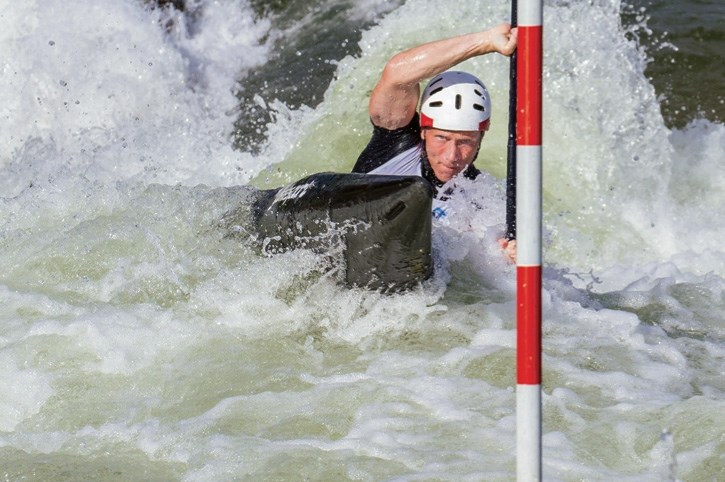What have you done by age 50? If your name is David Ford, you have dominated your sport nationally for nearly three decades. You have become a world champion in a brutal sport which marries cardio, finesse and brute strength.
What have you done by age 50?
If your name is David Ford, you have dominated your sport nationally for nearly three decades. You have become a world champion in a brutal sport which marries cardio, finesse and brute strength. You raised a perpetual motion machine in a two year old with your beautiful ski star wife Kelly Vanderbeek. You trained six to nine hours a day, learning every rock and eddy of the Kananaskis River. You bench pressed more weight at 49 than you did at 25. You've been to the Olympics five times, and kept going after your funding was cut. You beat cancer.
David Ford, the Canadian kayak legend, has accomplished more in his sport by 50 than nearly every other athlete in the nation. Now he's prepared for one more shot at Olympic glory in Rio de Janeiro this summer.
“I didn't want to go to Rio unless I had a chance at a reasonable result,” said Ford, fresh off a string of top-10 finishes overseas. “I didn't want to be an athlete tourist.”
Ford leaves next week for a chance to qualify for the one and only slalom kayak spot Canada has for Rio. He must first defeat the Canadian field in a race outside of Pemberton, B.C. From there, the top three Canadians will travel to Europe, where they will race on the world cup in Spain and France. The Canadian who earns the most points from those world cup races will go to Rio.
“Everyone is so close and the points are so tight,” said Ford, still jet lagged from his last competition in Europe. “I had a really good European trip where I had four top 10s. I would have had more, but I blew up in the final race, and had to sprint backwards to the finish.”
Ford has been synonymous with Canadian paddling. He first joined Team Canada in 1984, and won the country's first gold medal in 1992. By 1999 he was crowned world champion, and finished fourth and sixth at the Olympic Games.
Rio wasn't even on his radar until a severed tendon in his left elbow cost him a trip to the 2012 Games in London. He refused to go out on an injury, so Rio became his focus. He and Vanderbeek had their son in 2014, and Ford resumed training.
For years, he had prescribed to high intensity, interval training - long before it hit the mainstream.
“The sport and technology is so different than when I started. We were some of the first to benefit from that type of training. As I grew older, it became more and more important to prescribe rest and periodize recovery. I can't fake it anymore. The results have indicated it has worked,” Ford said.
His body in fantastic shape and his son approaching one, Ford received terrifying news from the doctor's office. They had discovered skin cancer with thyroid involvement.
“I'm in a sport that is considered extreme, and I've never been as scared as I was in that moment of my life. I was in shock,” Ford said.
Doctors originally feared the cancer was much more widespread, but thankfully that wasn't the case. Surgery was successful and the long road to recovery began. He didn't stop training, but his thyroid had been compromised by the surgery.
“I had to slow down. I had no energy and took time out of the boat. In the end, it was pretty minor. Sport wasn't on my mind - just staying healthy was my goal,” Ford said.
Training proved quite difficult. Ford's joints ached, his energy was extremely low and he thought age was catching up to him. However, once he was placed on thyroid replacement drugs, he improved.
“It was nice to train with full energy again. I thought age was the cause, but it was my thyroid. I was amazed by how much it affected me,” Ford said.
To prove to himself he could still compete at a high level, he traveled to Australia for a training camp with the best paddlers in the world, and that base carried into early season races.
“I feel good about my chances of going to Rio. There are four of us with a real shot, and a few on the fringes as well. At the last bunch of races, I showed I am one of the top Canadians again, but I'll have to race smart and race fast to get the spot. It's going to be a real pressure cooker,” Ford said.
The qualifier course is artificial - steep, fast and fair. Ford has raced well on it in the past, so he likes his chances. He's built a good base by paddling the Kananaskis and Barrier Lake.
“I feel I prepared as best as I can,” Ford said. “It's not something you do, where you just wake up one day and decide to go to the Olympics. You work long and hard at it. The consistent effort is important, and not many people realize it takes that long a period to prepare for the Games.”
Before 50, no one can match Ford in that respect.
